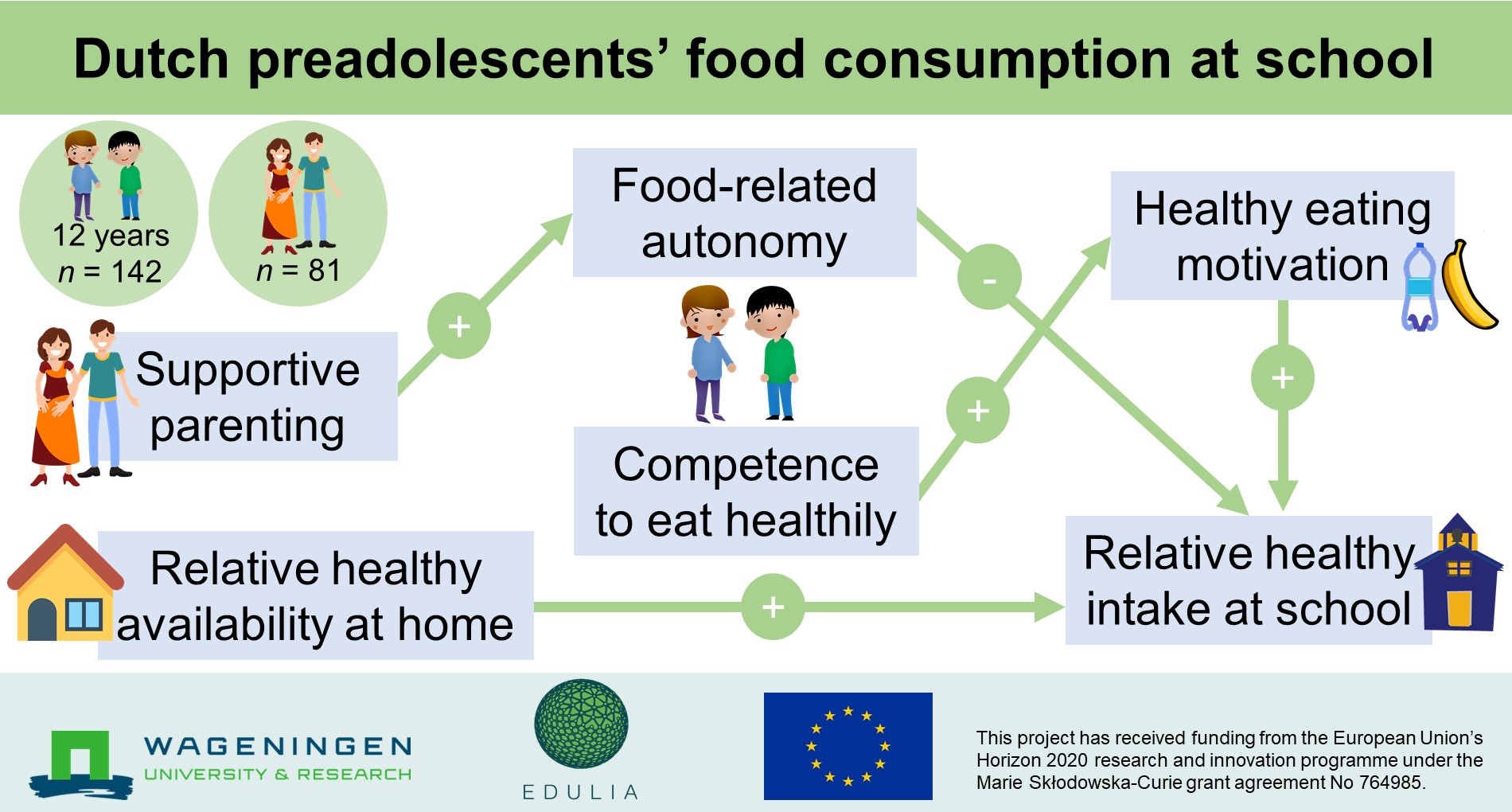New paper: Dutch Preadolescents’ Food Consumption at School

Roselinde van Nee (ESR4) published her first PhD paper in collaboration with her supervisors Ellen van Kleef and Hans van Trijp. The paper is about preadolescents’ healthy food consumption at schools in the Netherlands. A total of 142 preadolescents (on average 12 years old) and 81 parents completed questionnaires.
Making independent food choices
To what extent are preadolescents able to make their own food choices? This was measured with questions about preadolescents’ food-related autonomy. For example: can preadolescents decide for themselves when to consume snacks? And are they allowed to use pocket money to buy foods or drinks? On average, preadolescents answered that they were able to do these things regularly (sometimes or often). Parents answered the same questions and the responses from preadolescents and parents were compared to see if they agreed. Interestingly, preadolescents felt that they had more freedom to make their own food choices than their parents estimated.
It is recommended for parents to discuss decisions about foods with preadolescents. Talk about the benefits of healthy eating and encourage preadolescents to express their opinion. It is important to provide opportunities to practice making healthy food choices. Parents can support preadolescents by allowing them to make food decisions. For example, give preadolescents a say in healthy family eating by involving them in meal planning and preparation. Furthermore, encourage healthy options by making healthy foods accessible, convenient and readily available in your home.
Preadolescents’ ability to eat healthily
Do preadolescents feel competent to eat more healthily? Two challenges about healthy eating were proposed to see if preadolescents thought they were able to achieve them. The first challenge included refraining from eating candies or snacks for 7 days and only eating fruits or vegetables as a snack. Although 48% of preadolescents thought it would be difficult to achieve this challenge, 66% felt confident in their ability to do this. The second challenge included refraining from drinking soft drinks or fruit juice for 7 days and only drinking water. In total, 79% felt confident in their ability to achieve this challenge and 30% thought it would be difficult.
Parents answered the same questions about their child’s ability to achieve the challenges. The responses from preadolescents and parents were compared. Preadolescents were less confident in how well they could eat more healthily than their parents thought. So, for parents it is important to realize that preadolescents may need some encouragement in making healthy choices. Help your preadolescent to set specific healthy eating challenges and be supportive and positive. It is also worthwhile to engage in healthy eating challenges with the whole family. In this way, you can help each other to achieve the challenge.
Healthy food intake at school
Approximately two thirds (63%) of preadolescents’ total snack and beverage intake at school was healthy. Preadolescents were highly motivated to eat healthily. For example, 73% agreed that they ate fruit or vegetables because it is important to them. Results of the study show that when preadolescents felt competent to eat healthily, they also had higher motivation to eat healthily and consumed more healthy options at school. In addition, the availability of healthy foods at home was related to more healthy food consumption at school. So, creating a relative healthy home environment may help your child to establish healthy eating habits. To support preadolescents, make sure to have plenty of healthy and appealing snacks available and visible, such as a bowl of fruit or snack vegetables.
More information? The paper has open access and can be found here: https://www.mdpi.com/2072-6643/13/5/1505
van Nee, R. L., van Kleef, E., & van Trijp, H. (2021). Dutch Preadolescents’ Food Consumption at School: Influence of Autonomy, Competence and Parenting Practices. Nutrients, 13(5), 1505.
ESR4, food choice, food competence, independence, pre-adolescents, preadolescents


